

Ah, ovulation. The single most important time in a woman’s cycle, especially if she is trying to get pregnant. Ovulation is the only time during a woman’s cycle that she can actually get pregnant. Claim Your 20 Free Ovulation Tests – Click Here
This is why it is so very important that women understand all the different aspects of ovulation, so they can have the best possible chance of getting pregnant.
Ovulation is the time during the month when a woman’s mature egg is released from her ovaries and travels down the fallopian tube for a chance at being fertilized. Every month, a woman’s ovary releases an egg, and most of the time, the ovaries alternate turns. One month, an egg will be released from the right side, the next month, the left side, and so on.
The egg spends the whole month maturing in the ovary, and getting ready for ovulation day. Once the egg is fully mature, that is when the egg is released. The egg then travels down the fallopian tube, down towards the uterus where it will wait to be fertilized. If, at this time, the egg is fertilized, the fertilized embryo will implant into the uterine wall, and a pregnancy will result.
However, if the egg is not fertilized, the lining of the uterine wall, which has been thickening in preparation for the possibility of fertilization and pregnancy, will begin to shed. This process usually takes around two weeks, and, as you may have guessed, is when menstruation occurs.
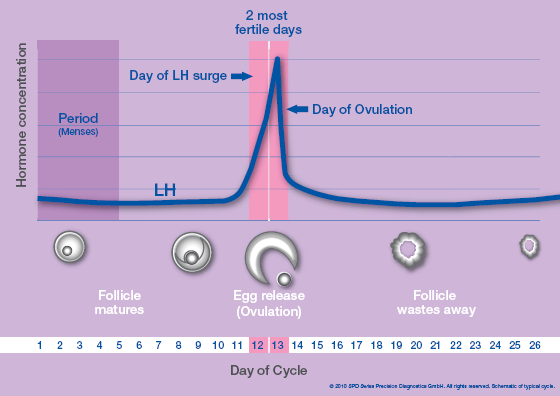

Although ovulation itself is a pretty simple thing, there are so many details regarding ovulation that are so very important, we simply can’t leave them out.
First, and very importantly, women need to know that the timing of ovulation is absolutely KEY when it comes to being able to get pregnant.
This is because, as crazy as it may sound, the egg only lives for somewhere between 12 to 24 hours in the body. After that, it begins to disintegrate and die.
This is why it is so very important for women to know when they are ovulating, because there is only a limited period of time when pregnancy can actually occur. Most women, especially when just starting out, just have sex and hope for the best, thinking that more sex equals a better chance of getting pregnant. Of course, we know now that is not the best choice, and having sex during a time other than the small fertile window, while fun, will not result in a pregnancy.
For couples who are serious about getting pregnant, they have to be super diligent about finding that fertile window and timing sex to fit within that time frame. It might not sound super romantic, but the truth of the matter is that when it comes to getting pregnant, sometimes couples have to get a little bit scientific.
Some couples simply fall pregnant without even trying, without having to know when they ovulate, and their pregnancy is simply a surprise.
However, most of us are not that lucky, and sometimes, couples are going to simply have to put on their detective hats and track down the fertile window on their own.

Many women find it very confusing when it comes to menstruation and ovulation. While it is true that the two of them are related, they are not dependent on each other.
That’s right. Women are able to have their period, even if they have not ovulated or are not ovulating regularly. Likewise, women are able to ovulate even if they are not having regular periods, or even if they are not having periods at all.
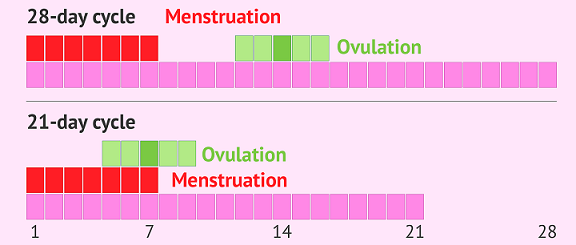
Curiously, some women can actually experience bleeding or spotting during ovulation, which is sometimes mistaken for the start of a menstrual period. It is a longstanding myth that if a woman is not having a period, she is not ovulating. Many people also believe that women who are not ovulating will not have their periods, so as long as a woman is having a regular period she is fertile.
However, things are not that simple when it comes to fertility, and it is important to remember that menstruation and ovulation are not mutually exclusive body processes.

The interesting thing about ovulation is that it actually starts when a woman is born. Every single woman is born with millions of eggs, ready and waiting in her body until she grows up, matures, and begins ovulating.
The thing to remember is, while women are born with millions of eggs, they are also born with a finite number of eggs.
This means, the number of eggs a woman is born with will never, ever increase. In fact, the number of eggs a woman has will continue to decrease every month from the time she starts to ovulate until all of her eggs are used up.
The body will usually use up one egg per month, however, sometimes there will be a “glitch,” when the body will release two or more eggs.
Just in case you were wondering, this is how twins, triplets, etc come about!
(Well, fraternal twins, anyways! Identical twins are made from a single egg that splits off into two different embryos, so make sure that you don’t get those two mixed up!)

There are some other really interesting things about the human body as related to ovulation and fertility as well, that most people do not know. Our bodies are so smart, that they somehow know to use the strongest and most high quality eggs first.
This is the reason why women who are in their late teens and/or early twenties are more fertile than older women, and also the reason that younger women have fewer problems with their pregnancies.

Younger women are less likely to have babies with birth defects or birth problems because their bodies automatically know to use the “best quality” eggs first. It really is crazy to think about, all of the things that our bodies know how to do, and how it automatically takes care of many things for us without us having to worry about it at all.
Older women, on the other hand, are more prone to have both fertility problems as well as birth complications and birth defects.
This is because, by the time a woman reaches her late 30’s or early 40’s, most of her best quality eggs have already been used.
A woman may not have very many eggs remaining at this point, and the eggs that a woman does have remaining are likely to be of a poor quality. This can lead to issues with birth defects and chromosomal abnormalities, and even a higher rate of miscarriage because the poor quality eggs might have a hard time implanting properly.
By the time a woman reaches the age of 42-45, however, most of the time all of her eggs are gone completely. This is why it is very rare to hear of a woman getting pregnant naturally over the age of 42-45, unless she has used assisted reproductive techniques like IVF.

When it comes to the timing of a woman’s ovulation and her fertile period, consideration has to be made as to the timing of her entire ovulation cycle.
A woman’s monthly cycle is measured from the first day of her menstrual period until the first day of her next period.
That is how a woman would figure out the average length of her cycle, by counting from the first day of one period to the first day of the next period. The average length of a woman’s cycle is 28 days, however, this is only a general average.
Many women have cycles that are much longer or much shorter than 28 days. All of these cycles can be considered normal. That is to say, even a woman with a shorter or longer cycle than 28 days does not indicate a fertility problem. When it comes to the female body and fertility in general, many things can be considered normal, since every woman is made so differently.
Starting with the first day of a woman’s menstrual period as Day 1, most women usually ovulate somewhere between Day 11 and Day 21 of their cycle.
Ovulation usually occurs sometime during this period, which is known as the “fertile window.” However, it is important to remember that a woman’s actual fertile window is a very small amount of time, usually somewhere between 12 and 24 hours.
This is the ONLY time that a woman is actually and technically able to get pregnant. This is because after the egg is released, it only lives for around 24 hours before it starts to disintegrate and die. As you can see, this is why the timing of ovulation is so very important.
![]()

A very, very basic way to start out getting a good idea of when they might be ovulating is for women to simply use the calendar method to count the days. This method is not the most foolproof, since all women have different ovulation cycles. But it’s a good starting point.
Counting the days will usually only be a good method to try if women are on a pretty regular cycle, between 28 and 32 days. To use the simple calendar method for tracking ovulation, women can simply mark their first day of their period on a calendar, and then count to see when their next menstrual period should arrive, between 28 and 32 days later.
After marking down the day of the next expected menstrual period, women can simply count back between 8 and 18 days to see when the expected ovulation window will be.
This will give women a 10 day window of time that they might be expecting ovulation. As you can see, this method gives women only a very generalized guess, but it is a good place to start for women who have never tracked their ovulation cycles before, and who do have a regular cycle to start with.
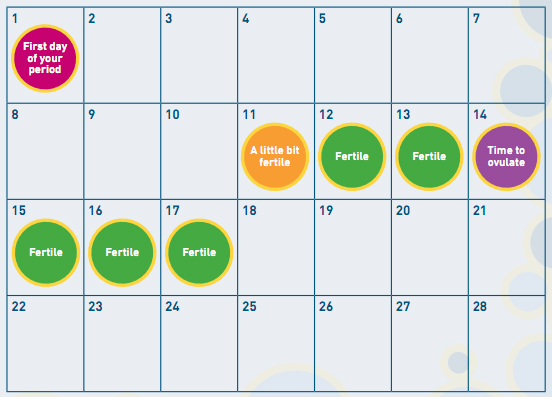
For timing sex when using a basic calendar tracking method, women can make sure to take advantage of the fact that sperm can live in the body for up to five days.
By doing this, women can take that 10 day window of time that they got from counting their days in the previous step, and start on the first day of that ten day window, having sex every other day.
By doing this, it will allow sperm to be ready and waiting for the egg to be released, no matter which day during the ten day window that ovulation actually does occur. Also, by having sex every other day during this 10 day window instead of every single day, this will give the man’s sperm time to replenish and rest instead of having sex every day, which can leave sperm less potent.
Of course, this is not a detailed and foolproof way to track ovulation, just a generalized idea and would make a great choice for couples who are just starting out and are interested in narrowing down their fertile window but not overly worried about how long it will take them to get pregnant.

Luckily for women who are trying to conceive, there are many different ways to more accurately track ovulation than the calendar method and to find out when a woman’s fertile days are. There are easy ways to track ovulation, and then more difficult and more detailed ways to track ovulation.
• Cervical Mucus Tracking
• Body Signs
• Basal Body Temperature
• Ovulation Apps
• Ovulation Predictor Kits
Women will find that they can use multiple ways of tracking ovulation at once, in order to give themselves a better idea of their ovulation day, and to make sure that they are getting the most accurate possible results. There are tons of different options for fertility tracking and they are all different, and can be tailored to fit a woman’s specific needs or preferences.
Let’s read on to find out some of the most common ways to track ovulation.

Cervical mucus is the natural mucus secretions that the cervix produces during the course of a woman’s cycle. Cervical mucus changes in scent, consistency, color and more during a cycle, ranging from spongy and white to clear and stringy, and many other things in between. Interesting, isn’t it?
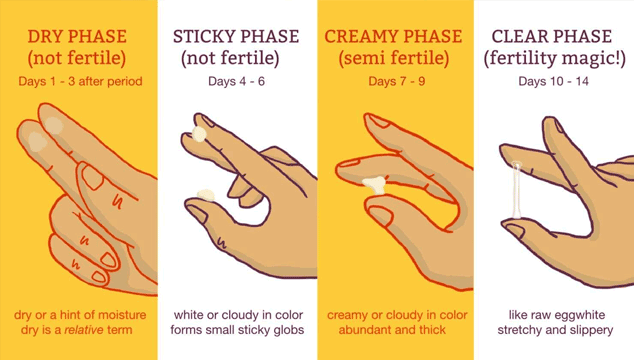
The different stages of cervical mucus indicate different things about the body. For example, dry or sticky cervical mucus means that a woman is not yet ovulating. Wet cervical mucus means that a woman is probably close to ovulation, and a creamy cervical mucus can indicate that ovulation might be coming soon.
However, the optimal cervical mucus for indicating that ovulation is coming near is a cervical mucus that is the consistency of egg whites.
This means, clear, stringy, stretchy and resembling the consistency of egg whites. When a woman sees egg white cervical mucus, it usually indicates that ovulation is probably coming within a few days. So time to get busy!
Egg white cervical mucus is best for conception because it helps to protect the sperm on its journey to travel to the egg. Some types of cervical mucus are actually detrimental to sperm (called hostile cervical mucus), so that is why it is important to wait for egg white cervical mucus.
To check your own cervical mucus, use two clean fingers to touch your cervix (which is located at the end of your vagina). You will be able to remove your finger and see what the cervical mucus looks like. You also will see it on toilet tissue after wiping, if that suits you better. Keep a close eye on this during the different weeks of your cycle, and you should be able to notice a big difference as time goes on.

When it comes to ovulation, sometimes, a woman’s body really does know best. Women can learn a lot about their bodies and their body’s processes by simply paying attention to the signs that the body sends out.
For example, most women do not know that the body actually sends out signs and signals that ovulation is near. There are a ton of different ovulation “symptoms,” and they can range from very typical and normal, to things that women would probably never think of.
Read on for some examples of body signs that the body sends out when ovulation is near.
• Cervical mucus – First of all, as we already mentioned, changes in cervical fluid are a sign that ovulation is going to be occurring soon in the body. A change in basal body temperature and a change in cervical feeling and position can also correspond with ovulation getting ready to occur, but we will talk about those later in this article.
• Heightened senses – Believe it or not, some women actually report noticing a heightened sense of smell, taste, or vision near the time of their ovulation.
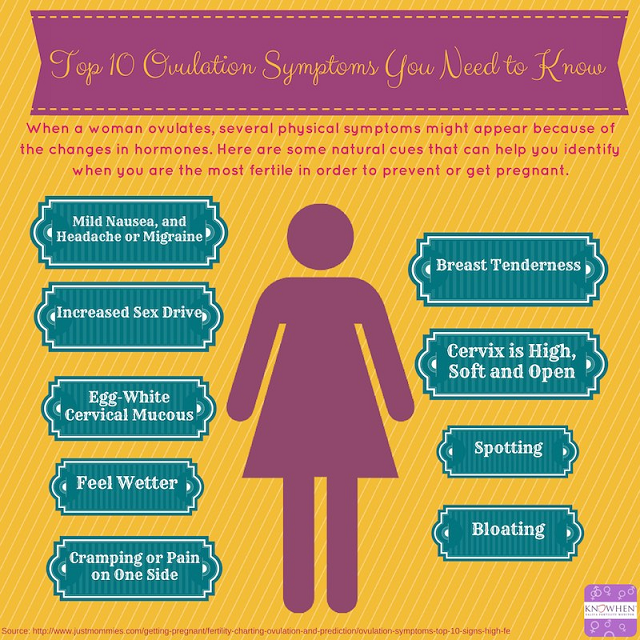
• Increased sex drive – Other women report that they have an increased sex drive near ovulation time.
• Cramps – Other very common signs of ovulation including abdominal cramps and or bloating, breast tenderness, light spotting, and also stomach cramps or pain on one side of the abdomen. That pain is referred to as Mittleschmerz, which is the German name for “middle pain.” This pain is usually localized on one side of the body, depending on which side of the body the egg is going to be released from.
These symptoms are not always recognized by every woman, but some women do experience them, and if women are careful to pay attention, they might notice they do experience more of these than they thought.

Another way to track fertility and ovulation is by using a basal body thermometer to track a woman’s daily body temperature. To track ovulation using basal temperature, women need to use a special thermometer, called a basal body thermometer. A basal thermometer is special because it measures body temperature at a very detailed degree.
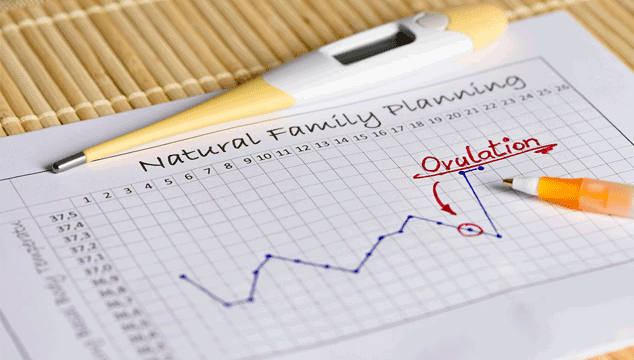
To track basal body temperature, women will need to take their temperature with their basal thermometer first thing in the morning, before even getting out of bed.
This is to ensure that women are getting an accurate reading and actually measuring the temperature of the body at rest.
Each day, women should chart their temperature on a chart, so they can keep track of their basal body temperature every single day. This way, after a few months of taking their temperature and charting, women will begin to notice that there is a pattern.
Shortly before ovulation each month, a woman’s body will likely experience a small temperature spike, of a just a degree or a few fractions of a degree.
This temperature spike should be very easy to notice on paper, when looking at a woman’s chart. When a woman notices this temperature spike, there is a good chance that ovulation will occur within 24 hours or so. This is a great way for women to track their fertility and know when their fertile days are, and basal body thermometers are very inexpensive, available all over, and easy to use.

Another simple and easy way for women to start tracking their ovulation is by the use of fertility tracking apps for smartphones and computer programs for personal computers and laptops.
There are a ton of different fertility apps out there, and there are free versions as well as paid versions for these apps. The way that they work is simple. Women download the app or programs and then will enter their information into the apps.
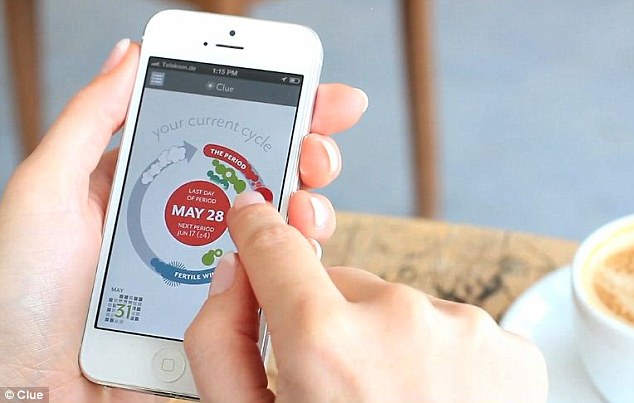
The apps usually ask for information like the day a woman’s period starts, whether or not she got a positive ovulation test, any symptoms like cervical mucus, cramping, mood swings, etc. and more. The apps ask all sorts of different questions, depending on the particular app that women choose.
It is very important that women who choose to use fertility apps make sure to enter their information every single day.
This is the only way that the app will have accurate information in order to track fertility. Still, even if a woman enters all of her information into the app, it is important to remember that the apps simply go by the information that the user enters. If a woman enters the wrong thing on the wrong day, or goes for many days without entering information, there will probably not be accurate information.
The good news about fertility apps is that they are designed to be used in conjunction with other fertility tracking techniques to improve the chances of getting accurate results.

Ovulation predictor kits are a great option for women who are getting started with trying to track their fertility. Ovulation predictor tests are really easy for women to use, they are inexpensive and they are available for ordering online or local pick up at any grocery store, drug store, or big box store.
The way that ovulation predictor kits work is much like a home pregnancy test works, using a woman’s urine and a test strip – but this time to test for the presence of LH, or Luteinizing Hormone, a hormone that spikes just prior to ovulation in most women.
Each ovulation predictor kit test will have two lines. One of those lines is a test line and one of those lines is a control line.
A woman will need to use her urine, either in a cup or midstream, depending on the brand of the test, to check her urine for the presence of LH. The control line on the test will be a certain darkness that will stay the same each time a woman tests.
However, the test line will get lighter or darker in color depending on how much LH is in a woman’s body. This means, the darker the test line, the closer a woman is to ovulation.
Once the test line and the control line are the same darkness, or if the test line is actually darker than the control line, this indicates that the surge of LH has occurred in the body.
Once the LH surge has occurred, women can usually plan for ovulation to occur within 12-36 hours from this time.
A few quick things to note about the use of ovulation predictor tests. First of all, the surge of LH in the body that indicates the coming of ovulation can happen in a very short period of time. Sometimes, it can happen within the span of just a few hours.
This means, if a woman is say, using an ovulation test every morning as soon as she wakes up, or just using an ovulation test every few days, it is actually pretty highly likely that she will miss the LH surge, and miss a positive ovulation test.
That is why it is recommended that once a woman is close to her ovulation time, she move up to using an ovulation predictor test twice a day!
This will help to ensure a better test result when using an ovulation predictor test.
Another important thing to remember regarding ovulation tests is that women need to make sure that they fully follow the instructions on the test in order to ensure an accurate result.
The truth is, all tests are not created equal. Some tests may advise women to take them at the same time of the day every day. Some tests may ask for a midstream urine sample and some may ask for a urine sample in a cup.
All in all, women need to remember that it is very important to follow the instructions closely when it comes to using ovulation predictor tests. It is also important to note that just because a woman receives a positive result on an OPK (Ovulation Predictor Kit) test, that does not mean that ovulation is going to occur. It is only a guess.
Some women have medical or health issues that allow their bodies to have the LH surge, but then ovulation does not follow up 24 hours later. This is why it is important to remember that an ovulation predictor kit test only looks for the LH surge, and not actual ovulation itself.

When women receive a positive ovulation test, it usually means that ovulation is going to occur within 24 hours or so after the test.
This means, once an ovulation test is positive, couples should get busy having sex!
The good news is that sperm can live for up to 72 hours inside the human body. We all know that the egg cannot live for a very long period in the body, only for about 12 to 24 hours.

This means that if couples can plan accordingly, they can have sex a few days before ovulation and actually have the sperm be “ready and waiting” to meet the egg when it is released. This is kind of like a “cheat” as far as trying to conceive is concerned, and many couples don’t realize that they can actually be doing this to increase their chances of conceiving.
Some experts say that having sex every day during ovulation week is a good plan for helping with conception. Other experts suggest only having sex every other day during ovulation week in order to give sperm a chance to replenish. Guess it depends if your husband’s sperm are Superman or not.

Of course, the very first step in a couple’s trying to conceive journey should be tracking ovulation, using one (or more preferably) of the above methods. By finding out when a woman’s ovulation day is, and when a woman’s fertile window happens to be, couples can really dramatically improve their chances of conceiving, and can plan to have sex accordingly.
However, it should be remembered that fertility tracking does not always work for every woman. As we mentioned before, some women will receive a positive ovulation test, but for certain health reasons, might not actually be ovulating at all.
Other women, no matter how often or regularly they test, will never receive a positive ovulation test. Read on for some reasons why women might not be able to track their ovulation using the methods listed above, and what it might mean if they never receive a positive ovulation test.

There are so many different factors that can affect ovulation, it can be difficult to pinpoint exactly when ovulation will occur for different women. First of all, every woman’s body is different and every woman’s physical health is different. Each woman’s body chemical makeup is different, which also affects ovulation.
There so many things that can affect a woman’s ovulation cycle. For example, stress can stop a woman from ovulating on time, or even stop her from ovulating all together. It can actually be a little bit overwhelming when you think about all of the different things that can affect ovulation and fertility, and it is enough to really get women stressing when it comes to thinking about getting pregnant.
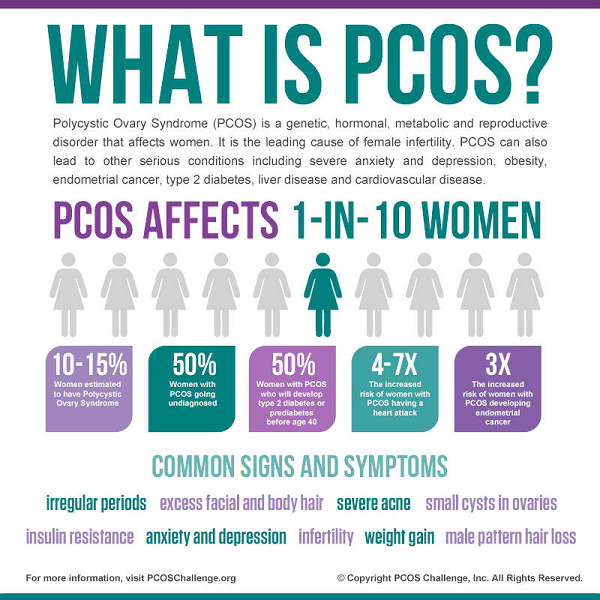
Certain health problems can also keep a woman from ovulating properly. There are so many different health difficulties that can hurt ovulation chances, from endometriosis to PCOS, and many other problems in between. Even a simple cold or the flu fight can throw off a woman’s ovulation cycle.
This is why it is so important for women to track their ovulation in order to find out their fertile days, especially at the beginning of their trying to conceive journey. This is because it can be so difficult to pinpoint ovulation time, especially when a couple is just starting out.
Some women might not even be ovulating at all, so this is why it is very important for them to try to track ovulation before they start trying to conceive in order to know exactly what is going on with their bodies and in order to give the best chance of trying to conceive.


PCOS, or PolyCystic Ovary Syndrome, is a very common health issue for women of childbearing age.
PCOS is such a common condition, that it actually affects up to one in ten women of childbearing age.
It is classified by hormonal problems as well as issues with metabolism that can affect a woman’s health, and in turn, her ability to get pregnant. An issue with unbalanced hormones in the body is what is ultimately responsible for causing PCOS, although getting those hormones back to the right balance and the right levels can sometimes prove to be a problem.
When PCOS is present, the body might not release eggs from the ovaries like it should, or the eggs that are released are not of a good quality like they should be.
PCOS is one of the leading causes of infertility in women, and it can also cause multiple fluid filled cysts on the ovaries.

While it might seem like a condition as serious as PCOS would have tons of symptoms to be on the lookout for, it doesn’t always go that way.
Honestly, many times, women find out that they have PCOS only after visiting a fertility doctor when they are having trouble getting pregnant.
However, PCOS does have some symptoms that women can be on the lookout for. If women notice more than one or two of these symptoms, it might be a good idea to talk with her doctor to determine if PCOS might be an issue in her own particular case.
Some of the most common symptoms of PCOS include having irregular periods. Some women with PCOS might not even be having periods at all. Women with PCOS often have problems with acne, not just on the face, but on the chest, and upper back as well. Women with PCOS often have issues with thinning hair or even bald spots, and darkening of the skin along neck creases or under the breasts. Skin tags are also, for some reason, very common in women with PCOS.
Since women who suffer from PCOS often have higher than normal levels of male hormones (androgens) in their bodies, their bodies often suffer from problems that are often seen in men, as we mentioned before with the thinning hair and baldness.
Women with PCOS often also experience excessive hair growth, in many of the places that men experience hair growth. This includes hair growth on the face, stomach, back, chest and neck. This condition is known as “hirsutism” and actually effects upwards of 80 percent of women who have PCOS.
Also, since women with PCOS often have problems with their insulin and blood glucose levels, they often also have problems with excessive weight gain and trouble losing weight, especially around their stomach areas.

PCOS is such a very common condition out there, it would seem obvious that doctors would have already figured out the cause and how it can be fixed!
However, that is not the case. Doctors STILL are not sure totally what causes PCOS, however they know that high levels of androgens (male hormones) can have a part in the problem.
Higher levels of male hormones can, as one might expect, keep the body from releasing eggs every month as the body is supposed to.
Women with PCOS also suffer from insulin resistance, which causes unbalanced hormones, and can lead to ovulation issues.

Since women who suffer from PCOS are not ovulating properly, it can be very hard for them to get pregnant. Most of the time, doctors will have to find a way to help women reverse the hormonal difficulties they are having in order to help ovulation resume and help women to be able to have a chance at a healthy pregnancy.
The good news is that PCOS is, usually and in most cases, very treatable. Women who suffer from PCOS are often able to reverse its effects and can usually go on to have healthy pregnancies and deliver healthy babies.

Treatment for PCOS will actually depend on each woman’s particular case and what her health needs are. Surprisingly, some women will find that if they are overweight, losing as little as five to ten pounds is enough to balance out the hormones and reset the bodies metabolism just enough to get a woman’s body back to ovulating properly.
This is great for some women, since their PCOS can essentially be reversed this way, without medications or other treatments. However, some women will find that they do need medication in order to help them get their PCOS under control.

There are a few different medication options for women who suffer from PCOS and want to become pregnant. One such medication is called Metformin, and it is usually used to treat diabetic patients, as it is a medication that helps with insulin resistance. While the main objective of Metformin is to help diabetic patients, it can also help women with PCOS in some cases, since insulin resistance is a problem when it comes to PCOS as well as diabetes.
However, the main and most commonly prescribed medication to help with PCOS is Clomid.
Clomid is a fertility medication that helps women who are not ovulating properly. Clomid is actually the most commonly prescribed fertility medication out there, and it has been a medication that has been used and recommended by doctors for more than 40 years.
Clomid helps to stimulate a woman’s ovaries and “motivates” them into producing and releasing mature eggs.

Clomid can actually help to stimulate ovulation in up to 80% of women who take the medication.
Of course, that does not mean that 80 percent of the women who take Clomid will get pregnant and give birth, but that the medication itself will stimulate ovulation in more than 80 percent of the women who use it.
This can be a great way to treat PCOS, and Clomid is usually a very mild drug, with few side effects, making it a great choice for many women. If medications like Clomid don’t help with stimulating ovulation, doctors can sometimes do surgery to help, or women might need to try assisted reproductive techniques like IVF (in vitro fertilzation).

While health conditions like PCOS can cause problems with ovulation in many women, it is not the only thing that can make ovulation difficult. There are tons of different things that can make ovulation difficult.
Some examples of things that can affect ovulation are weight gain or weight loss, emotional stress, health problems like serious illnesses or the flu, and also in some cases, too much exercise can cause women’s ovulation cycles to come to a complete halt.
Many women automatically think that it is only health problems that cause issues with ovulation, but that is not actually the case. It’s easy to see that there are a ton of different things out there that actually do affect fertility and ovulation, and it’s not always the most obvious culprits out there that do the most damage.

As we mentioned before, Clomid is likely to help many ovulation problems that women might be experiencing. As we mentioned before, Clomid is definitely and by far the most common fertility medication that is prescribed to women for any sort of fertility related problem.
Clomid is a medication that has been used for years and years, and has a great track record when it comes to stimulating ovulation in women.
Clomid helps to get the ovaries doing the right thing, and helps the body to get back into a place where it can get pregnant. In over 80 percent of women who take Clomid, the drug stimulates the ovaries to start producing mature eggs and to start releasing them as it should.
Of course, not all women who take Clomid will end up pregnant, but in the majority of cases, Clomid can reverse the ovulation issues that are standing in the way of fertility.

In most cases, Clomid will be just the trick for women who are not ovulating. However, something really important to remember is that Clomid can actually overstimulate the ovaries in some rare cases.
When Clomid works TOO well, it can cause the ovaries to actually release more than one single egg.
Sometimes the ovaries will release two eggs, and in rare cases, even more than two eggs. This actually can lead to women having twins, triplets, or higher order multiples, depending on how many eggs are released and fertilized in a given cycle.
Of course, the chances of having twins or higher multiples isn’t a crazy high amount with Clomid, but it does still exist. The actual truth when it comes to Clomid twins is that between 5 to 8 percent of Clomid pregnancies lead to twin births.
While the media likes to hype things up and make it sound like every woman who gets pregnant when taking Clomid will end up with twins, as you can see, there really isn’t that big of a chance.


Some women are not interested in taking Clomid or any other type of fertility medication in order to get their ovulation cycle in order. Some women want to only use natural ways to stimulate ovulation and to boost their fertility. Luckily when it comes to boosting ovulation naturally, there are tons of different options out there.
Women can choose one or more than one of these natural ways to give their fertility a boost, and in doing so, can really increase their chances of getting pregnant.
Many women are interested in choosing a lifestyle that doesn’t include any chemical substances or medications, and when it comes to pregnancy, many of these women only want to use natural means and methods to get pregnant. Read on for some of the best ways to improve ovulation and fertility the natural way.

Another really great way for women with ovulation issues to help themselves is by the use of fertility herbal supplements. Fertility herbs are all natural, plant based supplements that have been used for hundreds of years. The entire world of herbal medicine is an ancient practice that has been around forever, and will continue to grow in popularity as more people today look for natural and holistic fertility treatments.

There are literally hundreds of different herbal remedies out there that can be used for anything from bringing on an absent period, to helping with sexual desire, to helping to start labor, and everything in between.
Women who are interested in using herbal fertility supplements to boost their ovulation should definitely make sure to do their research so they know that they are doing the right thing for their bodies and that they are not doing anything that could work against their fertility.

Vitex is probably the most well known of all fertility herbs. Vitex is also sometimes known as chasteberry. Vitex has long been known as one of the most powerful, yet also most gentle and safest of the fertility herbs out there on the market today.
An interesting thing about Vitex is that it is not a hormone in and of itself, but it acts on the pituitary gland and other hormones in the body to try to get everything balanced out and working in good order.
Vitex is great for restoring overall hormonal balance to women and also with gently pushing the body towards ovulation. Vitex can really help with a wide range of fertility related problems, from PCOS to absent periods, painful periods and much, much more.
This one really is one of the most versatile and helpful fertility herbs out there.

Flaxseed oil is something that you might have heard of people adding to their diets when they want to be extra healthy or when they start on a weight loss plan.
However most women have no idea that flaxseed oil is actually quite helpful when it comes to fertility related purposes as well.
Flaxseed oil is, much to many people’s surprise, chock full of Omega 3 Fatty Acids. This means that it can help to nourish a woman’s reproductive system. Flaxseed oil has been proven to be especially effective when it comes to helping women’s ovulation get back on track to where it needs to be in order to help them conceive.

When it comes to fertility herbal treatments that have long been helpful to women, evening primrose oil is definitely one of the most popular. As one of the most versatile herbal treatments, evening primrose oil can help women with a ton of different issues related to their fertility and reproductive health.

Evening primrose oil is especially popular for helping to improve the quality of a woman’s cervical mucus.
This will in turn give her a better chance of getting pregnant, and relates to ovulation as the cervical mucus is such an important part of ovulation.

Saw Palmetto is a herbal treatment that isn’t always talked about very much of the time, but it can be incredibly helpful for ovulation in women.
Saw Palmetto is great for helping to reduce the amount of androgens in a woman’s body. As we have mentioned before, large amounts of androgens are usually present in a lot of women who suffer from PCOS.
So, for women suffering from PCOS, Saw Palmetto can be a great way to reduce the number of androgens and then, in turn, help to resume ovulation. Women should definitely give that a try if they are suffering from PCOS and wanting to see a helpful result from herbal fertility treatments.

For women who are just starting out with using herbal remedies for boosting fertility or ovulation, it can be overwhelming to know where and how to start. Like we mentioned earlier, there are hundreds of different options out there when it comes to herbal fertility options.
Different fertility herbs are good for different fertility things, and in the beginning, it can be so hard for women to determine which ones they need to be taking, and in which dosages. This is where fertility blends come in to play.
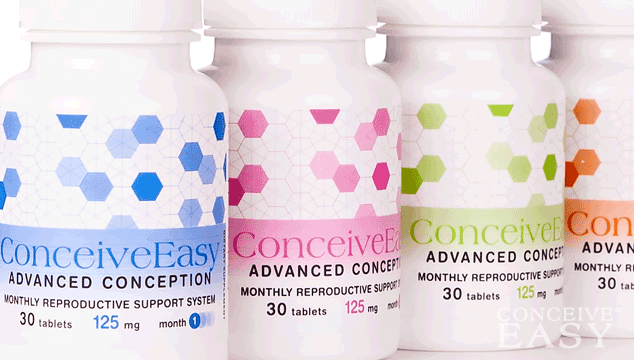
Fertility blends like ConceiveEasy are prepackaged, ready to use herbal fertility blends.
These fertility blends take several different fertility herbal supplements and combine them into one easy to use supplement. ConceiveEasy takes all of the guesswork out of using fertility herbs and herbal medicine.
All the work is already done, and all women will have to do is take their supplement once per day. These fertility blends like ConceiveEasy will take the appropriate amounts of each fertility herb and combine them so that women don’t have to research, measure or anything.
These can be a great option since they are already measured out, available without a doctor’s prescription, and can be delivered directly to a woman’s home for an inexpensive price.

Another thing that most women do not understand is that lifestyle choices really do make a difference when it comes to fertility and ovulation.
For example, many experts believe that women who use caffeine are more likely to have fertility problems, such as problems related to ovulation.
For women who drink a lot of soda or coffee, or even consume energy drinks, this could be a very bad thing. Women who are trying to conceive should try to cut back on their caffeine intake and instead, increase their water intake in order to cut down on the the chance of fertility issues.
Other lifestyle choices can have a huge effect on fertility as well. One of the biggest things that can affect fertility is using illegal drugs or abusing alcohol. Smoking cigarettes can also affect fertility as well. Drugs, alcohol and cigarettes are all things that have the possibility to temporarily affect ovulation and fertility, and in some rare cases, they can even permanently halt ovulation as well.
Not to mention the other plethora of health effects that that these drugs and substances can have on the body as a whole. If a woman does happen to get pregnant while using illegal drugs, alcohol, etc, there can be detrimental effects on her fertility, pregnancy and even baby’s health as well.
If you are trying to get pregnant, please definitely consider stopping the use of these things, for your fertility health, the health of your own body, your pregnancy health, and the health of your baby as well.

As we already know, a healthy and well balanced diet is one of the most important things that women can do in order to boost their overall health, fertility, and even ovulation.
It’s often referred to as a fertility diet, and by engaging in an overall healthy eating plan, women can actually control or change many of their health conditions and/or health problems just by changing what they are putting into their bodies.
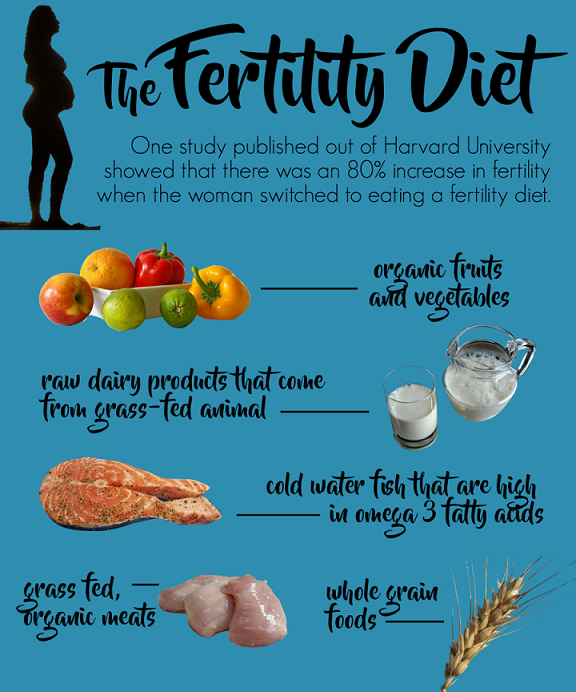
The basis of a good quality “fertility diet” is going to be based in mostly eating “whole” foods, or foods as close to the source as possible. Women should be trying to eat foods as close to they are found in nature, for example, a whole apple, raw carrots, or whole wheat bread.
A good rule of thumb for women who are wanting to eat better for their fertility is to incorporate as many organic fresh fruits and veggies as possible.
Add to that as many whole grains, such as whole wheat bread, brown rice or whole wheat pasta. For proteins, women should choose lean proteins such as chicken and fish. As for dairy products, experts actually say that by eating full fat dairy products, women will improve their fertility more than if they would have chosen low fat or fat free options.
There are many different things that women should leave out of their diets when they are trying to conceive as well.
First of all, there should be no more hitting the drive thru when women are trying to conceive. Fast food and pretty much all restaurant foods are unhealthy and contain tons of added fats, calories, preservatives and chemicals.
Another thing to cut out of a woman’s diet when she wants to conceive should be sugary sweets. Candy, cookies, crackers, donuts, ice cream.
All of these yummy things are super good to eat, but they can actually do harm when it comes to insulin resistance, and in turn, ovulation. Any sort of junk foods like chips, crackers, frozen foods, etc. should be avoided.
It is just as important to take the negative and harmful foods and drinks out of the diet as it is to add the most healthy foods to a woman’s diet. It is a great balancing act of what to add in and what to take out in order to get a woman’s fertility in check and help to improve the chances of conceiving.

As we have talked a little bit about before, another really important part of ovulation has to do with a woman’s weight and also with exercise. Women who are overweight will often have issues with their insulin resistance, which in turn, will lead to problems with ovulation.
When a woman is overweight, in many instances, her ovulation will be affected, and in some cases, women who are struggling with severe weight problems may not be ovulating at all.
A great thing about this, however, is that losing weight is very often just the trick to get womens’ bodies back on track and back to ovulating properly.
In fact, sometimes, doctors and experts believe that losing as little as five to ten pounds can actually reset a woman’s body to the point that ovulation can return!
On the opposite side of the spectrum, women who exercise too much or are too thin can also have problems with their ovulation cycles as well. When a woman loses too much weight or spends too much time on exercising, her metabolism is affected, and sometimes that effect can be severe.
Women can stop ovulating completely, and this is very surprising for many people to learn, since ovulation problems are usually thought of to be mostly for women who are overweight.
However this is definitely something that women need to keep in mind, because weight problems in any direction can really affect women’s ovulation and overall fertility. Women who are concerned about their ovulation, should definitely take their weight into consideration.

It might sound basic, but as we already know, sometimes the things that help the most are the things that are the most basic.

Just like our moms always told us, getting enough sleep is imperative for our body processes.
When we are sick, our bodies need sleep so we can heal. The same can be said for ovulation and reproductive body processes. When women’s bodies are having trouble ovulating, or her reproductive system is in some way not working properly, getting enough rest can go a long way towards helping her body to get back into proper working order.
The more sleep that a woman gets, the more time her body has to heal what is broken, and the more well rested and energetic she will be. Getting enough rest is super important and should not be taken lightly when it comes to fertility, ovulation and conception.
Try to get to bed at a reasonable time, sneak in naps when time allows, and sleep in a little bit late on the weekends or when your schedule allows. In short, whatever you need to do in order to help yourself get enough rest and have more energy is going to be great for your health in the long run.

Another really interesting twist on ovulation and what helps and harms it comes in the form of stress. Stress, as we all know, affects every single aspect of our entire lives, and fertility is not left out.
When it comes to stress, it’s all about the hormones. Stress makes the body’s hormones go completely out of whack, as we all already know from our day to day lives. Stress causes the body to release the hormone cortisol, which is a very powerful hormone, actually sometimes known as “the stress hormone.” Cortisol is very, very powerful as a hormone, and can actually inhibit all of our sex hormones.
High levels of cortisol can actually cause ovulation to stop completely.
This is why women who have high levels of stress might find that they are having problems with ovulation.
This is why it is so so important for women to make sure that they are keeping their stress levels under control. There are so many different ways for women to keep their stress levels under control. First of all, making sure to get enough sleep can really go a long way towards staying well rested and being able to handle stress more easily.
Exercise is of course, another great way to manage stress, and it’s also good for your physical health as well.
For women who have issues with controlling their stress, it’s a good idea to find someone to talk to and confide in. Whether that person be a counselor or therapist, or a friend or family member, having a person to talk to about stress is a great thing to have.
Also, if women love animals, science has proven that having a pet is great for stress levels as well, so let your furry friend help you get your ovulation back on track!

When it comes to ways to boost ovulation and help fertility to be the best it can be, many women are opting for alternative therapies and treatments that require no medical treatments.

These alternative treatments are considered to be all natural, and some women find that they are a great option for boosting fertility in a very natural way.
• Fertility acupuncture – One of the most popular alternative therapies for fertility is fertility acupuncture. It has been one alternative fertility treatment that is really gaining in popularity for women, and many women truly believe that fertility acupuncture has made a huge difference in their lives. Finding a experienced practitioner to perform the acupuncture treatments is going to be one of the most important parts. It seems that fertility acupuncture can help the body to release beta endorphins, which are said to be able to help improve fertility and control ovulation.
• Fertility Massage – Another really popular alternative fertility therapy would be fertility massage. This is a very popular alternative fertility technique, and many women are finding that it is helpful to boosting fertility and helping with ovulation.
Fertility massage can be performed by a professional who has experience in this type of stuff, or women can actually learn how to do fertility self massage. Fertility massage to stimulate the ovaries and other reproductive organs can really help to get blood flowing and can, in turn, help to boost fertility.
• Meditation – Other alternative therapies like meditation can also really help women to focus on their fertility as well, so women should look into those as well, if they think that might be something they are interested in.
This is a very quickly growing area of treatment and women should take alternative fertility practices into consideration since they are very safe and have been used for hundreds of years to boost fertility in many women. Making sure to find a very experienced and trustworthy practitioner will go a long way towards seeing positive results with these methods, so women should keep that in mind as well.

One common question that many women have about their ovulation and fertility is the question of if certain medications, be it over the counter medications or prescription medications, can affect fertility and ovulation.
This is a very important question to ask, since it would be counterproductive for a woman to be trying to conceive and trying to get pregnant while taking a medication that might actually be preventing her from doing so.
The truth of the matter is, there actually are many different medications that can interfere with a woman’s ovulatory cycle and overall fertility in general. The hard part of this comes in when women have to decide if it is a better idea to go off of their medications in order to boost their chances of getting pregnant, or if staying on the medications and controlling the problem they are taking the medications for is the best idea.
This is where a doctor can be very helpful in assisting women with weighing their options between going off of their medications to help with conception or staying on their medications to control health problems.

So, what types of medications can actually affect ovulation and fertility in women?
The answer is many different types. It’s not just prescription medications that can affect women’s fertility either. Over the counter medications, vitamins and supplements can do the same things to ovulation and fertility as well.
For over the counter medications, women should be especially cautious when using them while they are trying to conceive. This is because, in many cases, not much research has been done regarding the effects on over the counter medications when it comes to fertility and ovulation.
However, many experts and doctors believe that popular NSAID medications (Non Steroidal Anti Inflammatory Drugs) like Motrin and Advil could have a detrimental affect on ovulation.
Many doctors believe that these popular and commonly used medications can actually send a message to the ovaries, and keep the egg from being released. This is a huge deal for women who are trying to get pregnant and are also taking these over the counter medications. Women should talk with their doctors regarding this and see if their doctors suggest halting the usage for these medications while they are trying to conceive.

Many women take prescription drugs every single day to combat a wide variety of ailments and illnesses, conditions and problems that they suffer from. Our advanced medical technology today makes it possible for almost every condition to be controlled with medication, but what does that mean when it comes to how to affects ovulation and fertility?
![]() Antidepressants – Doctors say that prescription anti depressant or anti psychotic medications can definitely have a damaging effect on fertility.
Antidepressants – Doctors say that prescription anti depressant or anti psychotic medications can definitely have a damaging effect on fertility.
They are responsible for changing and altering hormones. Studies have shown that women taking these medications do take a much longer time to get pregnant, and some of these medications have even been associated with higher risks of miscarriage and preterm birth.
![]() Steroids – Prescription steroids can also have a similar effect on the body’s processes, since they are made from testosterone.
Steroids – Prescription steroids can also have a similar effect on the body’s processes, since they are made from testosterone.
![]() Epilepsy medications – It is also important to note that some prescription epilepsy medications can also be a problem for women who are trying to conceive.
Epilepsy medications – It is also important to note that some prescription epilepsy medications can also be a problem for women who are trying to conceive.
![]() Skin care medications – Some skin care prescription medications that women might obtain from a dermatologist can have similar effects on fertility as well.
Skin care medications – Some skin care prescription medications that women might obtain from a dermatologist can have similar effects on fertility as well.
![]() Thyroid medications – Another class of prescription medications that can be detrimental to fertility is thyroid medications. Many women have thyroid issues and take prescription medications in order to control their thyroid issues, but unless the dose is just right, this medication can affect a woman’s fertility.
Thyroid medications – Another class of prescription medications that can be detrimental to fertility is thyroid medications. Many women have thyroid issues and take prescription medications in order to control their thyroid issues, but unless the dose is just right, this medication can affect a woman’s fertility.
![]() Chemotherapy drugs – Also, as many women are already aware, taking chemotherapy drugs can result in permanent fertility loss in women.
Chemotherapy drugs – Also, as many women are already aware, taking chemotherapy drugs can result in permanent fertility loss in women.
Women who are trying to conceive and take prescription medications should definitely sit down with their doctors to discuss possible problems or interactions with the drugs and how they might affect their ability to conceive.
Women should be open with their doctor when discussing these things. Most doctors will want to weigh the pros and the cons associated with staying on the medication versus stopping the medication, and will want to work with a woman to either wean her off of her medications entirely, drop her dosage as much as possible, or switch her to an alternative treatment.
The main goal should be for a woman who is trying to conceive to be on as few medications as possible in order to give the best possible chance of conceiving quickly and easily.

As you can see, there are tons of different ways to help to boost ovulation at home, without seeing a doctor. Small and simple lifestyle choices can go a long way, as can herbal remedies, herbal natural supplements like ConceiveEasy, and other small things. However, there are some times and some certain medical conditions that just can’t be helped by women on their own.
Sometimes, women just simply have to seek out medical help. Doctors and experts like to give the rule of thumb that if a woman is under age 35, she should try to get pregnant for one full year on her own without the help of any medical doctors or specialists.
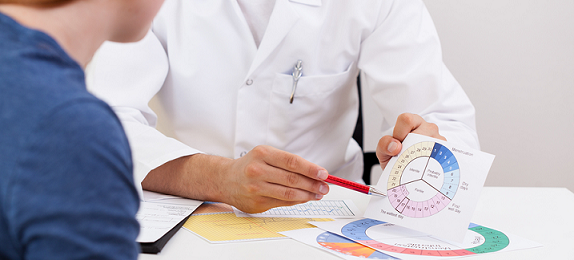
Since women who are over age 35 have more of a higher chance of fertility related problems, doctors and experts say that they should try to conceive for only 6 months before seeing a doctor and trying to get some fertility help.
Sometimes, women just need some help with getting pregnant, whether that be a fertility medication or another, more complicated, fertility treatment method. Women who do have trouble conceiving on their own, even after multiple months of trying, should not feel discouraged if things do not work out the way that they think they should.
Getting pregnant is not always a simple and easy task, and sometimes women need extra help, since sometimes there are underlying medical issues that exist that must be treated by a doctor.
This does not really mean anything bad, only that we all have different issues to be handled. Remember the tips and tricks mentioned in this article and hopefully you will find ways to better track and handle your ovulation for the best chance of conceiving.
Don’t forget how important ovulation is when it comes to conception, because it really and truly is one of the most important parts of conceiving.
If you have questions or concerns about your ovulation, it’s really important that you should talk to your doctor and find out if you have any sort of issue that can be remedied.

It’s easy to see that ovulation is one of the most important, yet also one of the most complicated body processes that women go through. Without ovulation, it is literally impossible for a woman to get pregnant naturally, so for women who are trying to conceive, making sure they are ovulating should be the first step.
Then, women can go from there regarding what their next steps should be. There are tons of different things that women can do to improve their ovulation, make their ovulation cycle more regular, or simply bring about ovulation in the event that they are not ovulating at all.
Ovulation is definitely a key factor in women’s fertility, and by understanding ovulation and how it works, women can have a little better understanding regarding themselves, their bodies and the way things work.
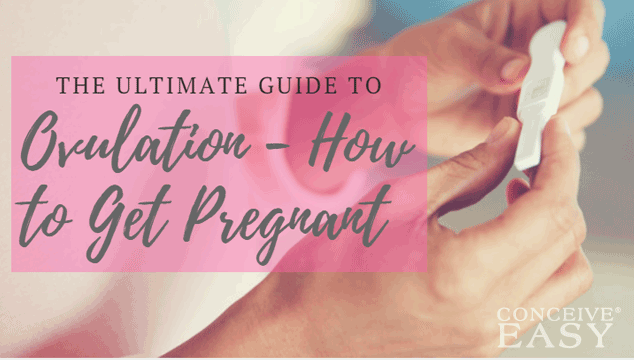

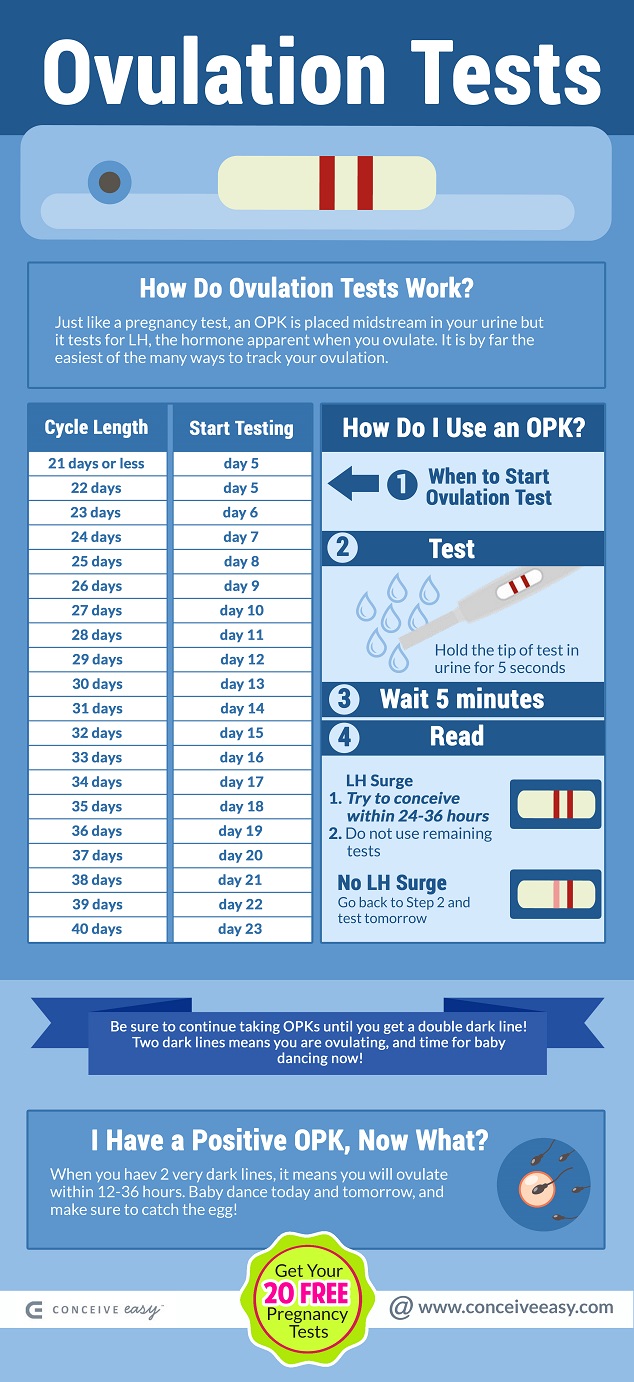
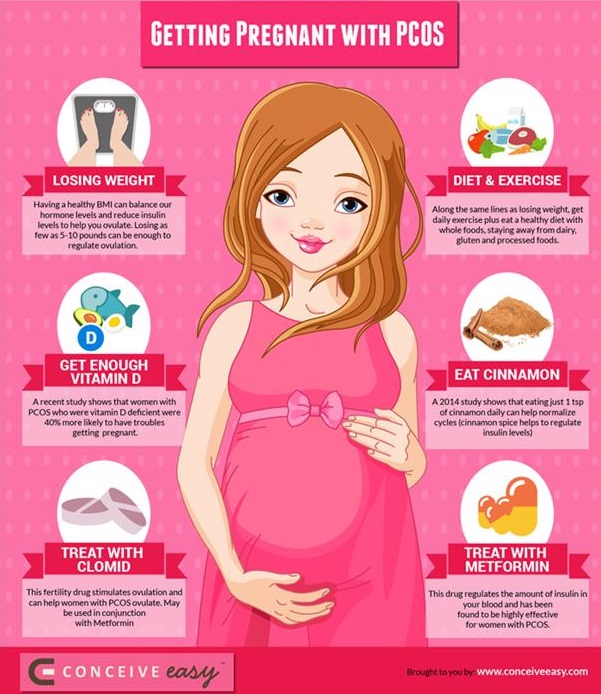








Comments